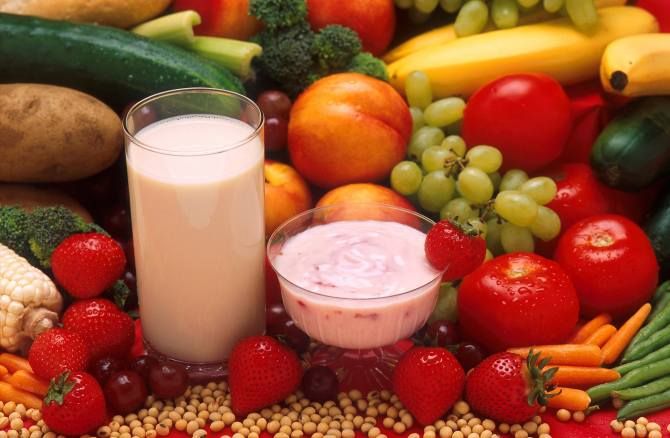 | « Back to article | Print this article |
On World Cancer Day, Dr J B Sharma, Senior Consultant, Medical Oncology, Delhi based Action Cancer Hospital, lists out some diet dos and don'ts for those undergoing treatment for cancer

Photograph: U.S. Department of Agriculture photo by Peggy Greb/Creative Commons
'Food is essential for survival', goes the cliche. For cancer patients in particular this line holds special significance, and yet many patients complain of a loss of appetite. Several studies have established the importance of a proper diet during cancer treatment as during cancer treatment along with the cancerous cells, healthy cells get killed too. That needs to be replaced through the intake of adequate nutrition. Diet maintenance combats weight loss and accelerates organ healing during cancer treatment, thus improving the effectiveness of the patients' treatment and successful recovery.
Nutrients can be broken down into two major portions: nutrients essential for growth, like proteins and vitamins, and those providing calories, like carbohydrates and lipids.
Ideally protein requirement for patients under cancer treatment is somewhere around 1gm/kg to 2gm/kg depending upon the stage of disease and strength of treatment whereas calorific requirement is determined to be around 2000 kCal/day. These nutrients are required not just for creating healthy tissues; they also repair the damage caused due to the medication.
For combating weight loss associated with the treatment, patients are recommended to add oil, butter and milk to their food to increase its calorific value.
Lean meat and fish are also recommended over red meat and processed meats for better nutritional values.
However, if you have a tender stomach, keep away from foods with grease and strong odours. In such cases it is advisable to opt for bland items like bananas, rice and apples.
Nutrient rich, high calorie food like avocados, whole grain breads, pudding, cooked cereals, beans and nuts are especially helpful in recuperating from the effect of treatment, whereas including vegetable and fruits in the diet augments the vitamin and fibre intake, leading to better digestion of food and a more complete absorption of the nutrients. Instead of three large meals during the day, plan five or six small meals at specific times over the course of the day even if you are not feeling hungry enough to ensure the intake of necessary nutrition.
Snacks can be prepared of bell pepper slices, carrot sticks and dried or fresh fruits to keep the hunger pangs away during meals, while the addition of garnishes like parsley, cherry tomatoes and lemon slices ensures your meals look more appealing.
Often during the course of treatment, patients feel nauseous and frequently vomit. Water and fluid intake is required to replace the loss of fluids and prevent constipation, and it is advisable for the patients to take 8 to 12 glasses of fluids every day to prevent dehydration.
Fruit and vegetable shakes and juices help in maintaining body fluid levels and provide the necessary nutrients, and soft foods like milk, yogurt shakes and soups are also helpful in case the patient has problems ingesting solid food.
In some cases, the patient may continue to exhibit anorexic tendencies and remains disinclined to eat. In such cases, medicines can be prescribed that help boost metabolism and increase hunger in patients whereas supplements may be used in addition to meals to provide the necessary nutritional upkeep.
However, as sometimes they can interfere with the efficacy of the treatment itself, these medicines and supplements must be discussed with the treating oncologist before use.
In addition to dietary intake, food safety is important as well, as sometimes the treatment can weaken the immune system leaving you susceptible to germs. Make sure any meat that you eat is well cooked, and a separate cutting board is used for raw fish, meat or poultry which should be washed thoroughly after every use.
Fruits and vegetables must be rinsed thoroughly, even if the outsides are non-edible. Perishable food items are to be refrigerated until use, and the expiration date must be checked on all items to avoid food spoilage. Throw away any mouldy food to prevent the chance of contamination and germ spread. All these measures ensure that not only do you get the required nutritional value essential for your treatment, but do so without any risk of contamination.
To summarise, a major factor for effective cancer treatment is the successful implementation of the diet plan. Healthy eating habits are the key towards successful recovery -- at hygienic food, take lots of fluid, and maintain the nutrition levels. In your bid for a quicker, more complete recovery, food is definitely the way to go!